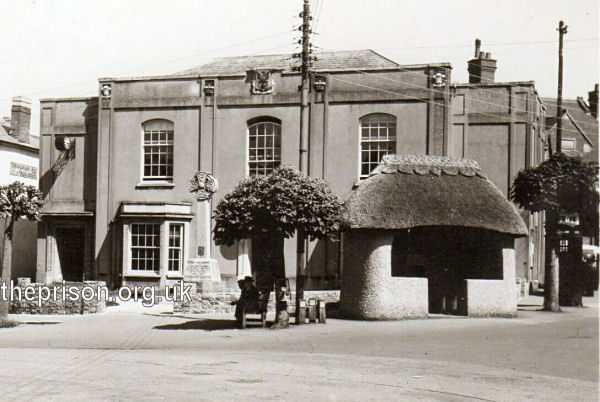Borough Gaol, Bradninch, Devon
The Bradninch Borough Gaol occupied part of the town's Guildhall on Fore Street. The original building was erected in the twelfth century, when Bradninch became a borough. It was rebuilt in the fifteenth century, and then was destroyed by a fire in 1665. Its replacement, constructed in cob and thatch was destroyed by a fire in 1832. It was rebuilt in stone and that building still exists.
A report in 1835 recorded:
The old Gaol was burnt down in the recent fire which consumed the guildhall and the neighbouring buildings. Serious charges were made with regard to the manner in which the old gaol had been conducted; and a culpable neglect on the part of the magistrates was proved, in suffering a want of cleanliness and proper conveniences to exist for a long time. A person who had been confined in the gaol was examined before us, and stated that the stench arising from the nuisances which were not removed, was almost insupportable. Before the building of the new gaol this had been corrected. The present gaol, which is just finished, was built at the expense of the borough, by a liberty-rate, the corporation contributing 120l., and the King, as Duke of Cornwall, 100l.; which latter sum had been intended as a subscription towards the relief of the sufferers by the fire, but which was, with the consent of the officers of the duchy, and of the committee for the relief of the persons suffering by the fire, transferred to the fund for building the gaol. The present gaol, which is under the guildhall, consists of two divisions, one for males and the other for females. The former contains two cells, a day-room and a yard; the latter, a cell capable of holding two persons, and a yard. The floors are flagged, and the windows are glazed. The magistrates have no regular periods for visiting the gaol, but they inspect it occasionally. The gaoler is one of the serjeants at mace.

Guildhall, Bradninch, Devon, date unknown.
Records
Note: many repositories impose a closure period of up to 100 years for records identifying individuals. Before travelling a long distance, always check that the records you want to consult will be available.
- Devon Heritage Centre, Great Moor House, Bittern Road, Sowton Exeter EX2 7NL.
- The National Archives, Kew, Richmond, Surrey, TW9 4DU. Has a wide variety of crime and prison records going back to the 1770s, including calendars of prisoners, prison registers and criminal registers.
- Find My Past has digitized many of the National Archives' prison records, including prisoner-of-war records, plus a variety of local records including Manchester, York and Plymouth. More information.
- Prison-related records on
Ancestry UK
include Prison Commission Records, 1770-1951
, and local records from London, Swansea, Gloucesterhire and West Yorkshire. More information.
- The Genealogist also has a number of National Archives' prison records. More information.
Bibliography
- Higginbotham, Peter The Prison Cookbook: A History of the English Prison and its Food (2010, The History Press)
- Brodie, A. Behind Bars - The Hidden Architecture of England's Prisons (2000, English Heritage)
- Brodie, A., Croom, J. & Davies, J.O. English Prisons: An Architectural History (2002, English Heritage)
- Harding, C., Hines, B., Ireland, R., Rawlings, P. Imprisonment in England and Wales (1985, Croom Helm)
- McConville, Sean A History of English Prison Administration: Volume I 1750-1877 (1981, Routledge & Kegan Paul)
- Morris, N. and Rothman, D.G. (eds.) The Oxfod History of the Prison (1997, OUP)
- Pugh R.B. Imprisonment in Medieval England (1968, CUP)
Links
- Prison Oracle - resources those involved in present-day UK prisons.
- GOV.UK - UK Government's information on sentencing, probation and support for families.
Except where indicated, this page () © Peter Higginbotham. Contents may not be reproduced without permission.



